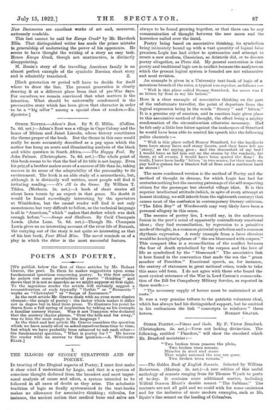POETS AND POETRY'.
[WE publish below the first of three articles by Mr. Robert Graves, the poet. In them he makes suggestions upon some fundamental questions concerning poetry. In this first article he points out some peculiarities of poetic " thinking " and shows that it is not so anarchic as we might suppose at first sight. To the ingenious reader the article will certainly spggest a reconsideration of such typically " Gothic " or " Romantic " works as "Christabel " or " Songs of Innocence." In the next article Mr. Graves deals with an even more elusive element—the magic of poetry : the factor which makes it differ not in degree but in kind from prose. To illustrate his point be draws from a full spring of inspiration by taking as his example a familiar nursery rhyme. Was it not Tennyson who declared that the nursery rhyme phrase, " Over the bills and far away," was to him the most magic in the language ?
In the third and last article Mr. Graves considers the question whieh we have nearly all of us asked ourselves from time to time, but which we have probably been ashamed to ask each other— the fundamental question, " What is poetry for P " He leaves the reader with an answer to that question.--A. Wisisasis. Elan.]
THE ILLOGIC OF STONEY STRATFORD AND OF POETRY.
Ix treating of the Illogical aspects of Poetry, I must first make it clear what I understand by Logic, and that is a system of conscious thought deduced from the broadest and most imper- Banal analysis of cause and effect, a system intended to be followed in all cases of doubt as they arise. The scholastic tradition of logic as finally systematized in the text-books makes no allowance for associative thinking; ridicules, for instance, the ancient notion that medical bane and salve are always to be found growing together, or that there can be any communication of thought between the new moon and the horseshoe nailed over the lintel, Poetry being based on associative thinking, its symbolism being intimately bound up with a vast quantity of logical false presaists, Logic has had either to systematize and attempt to create a new medium, Classicism, as Aristotle did, or to disown
poetry altogether, as Plato did. My general contention is that poetry and traditional logic are in conflict because the analyses on which the present logical system is founded are not exhaustive and need revision.
An example is given in a University text-book of logic of a notorious breach of the rules, a typical non sequitur, as follows ;—
" Well is this place called Stoney Stratford, for never was I so bitten by fleas in my life before."
Here is a clear example of associative thinking on the part of the unfortunate traveller, the point of departure from the logical expression being in the words " Stoney " and " bitten." It is a genuine cry of emotion, and in emotion logic gives place to this associative method of thought, the effect being a mighty condensation of the circumlocution otherwise necessary. Had
he felt only a little less bitter against the innkeepers of Stratford
he would have been able to control his speech into the following polite channels :- " Well is this place called Stoney Stratford, for the landlords here have stony faces and stony hearts, and they have left me ' stony,' as the saying goes ; and the discomfort of my bed ! I would have as lief lain out on the stones by the roadside, for there, at all events, I would have been spared the fleas 1 In truth, I have been badly bitten ' in two senses, for they mado me pay half-a-guinea for a blanket full of fleas and a mattress hard as stones 1
The more condensed version is the method of Poetry and the
method of thought in dreams, for which Logic has had for centuries nothing but the sneering patronage of the self-respecting citizen for the grotesque but cheerful village idiot. It is this superior intellectual attitude (which, in spite of every attempt at honest thinking, we still inherit from the eighteenth century) that
causes most of the confusion in contemporary literary criticism. " The Idiot Boy" of Wordsworth may very likely have been a
personal allegory in this sense. The essence of poetry lies, I would say, in the unforeseen fusion in the poet's mind of apparently contradictory emotional ideas ; they find reconciliation, by regression to a primitive mode of thought, in a common pictorial symbolism and a common rhythmic expression. A ready example from a locus classicus would be Aeschylus's phrase of " the sea blossomed with corpses." This compact idea is a reconciliation of the conflict between the fear of death symbolized by the corpses and the love of life as symbolized by the " blossomed." The associative link is here found in the convention that made the sea the " green meadow of Poseidon." Emotional speech, as, for instance,
the oratory of statesmen in great national crises, tends to take this same odd form. I do not agree with those who found the most cynical utterance of the War in Lord Carson's commends. Lion of the Bill for Compulsory Military Service, as reported in. these words :- " The necessary supply of heroes must be maintained at all costs."
It was a very genuine tribute to the patriotic volunteer ideal, which has always had his distinguished support, but he omitted in his enthusiasm the link " conscripts to reinforce " these


































 Previous page
Previous page